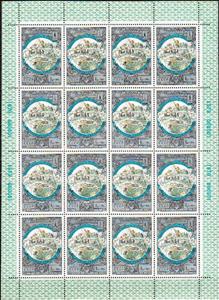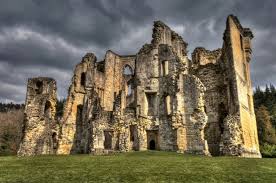Full Pane: Ruins of the Tbilisi Fortress (Soviet Union, USSR 1979)
Ruins of the Tbilisi Fortress (Soviet Union, USSR 1979)
05 September (Soviet Union, USSR ) within release Summer Olympic Games 1980 - Moscow (XI) Tourism (I) goes into circulation Full Pane Ruins of the Tbilisi Fortress face value 16*(1+0.50) Russian ruble
| Full Pane Ruins of the Tbilisi Fortress in catalogues | |
|---|---|
| Unificato: | Un: SU 4617MF |
Full Pane is square format.
Also in the issue Summer Olympic Games 1980 - Moscow (XI) Tourism (I):
- Full Pane - Concert Hall at Tbilisi face value 16*(1+0.50);
- Full Pane - Museum of International Friendship, Tashkent face value 16*(1+0.50);
- Full Pane - Ruins of the Tbilisi Fortress face value 16*(1+0.50);
- Full Pane - Samarkand Mosque face value 16*(1+0.50);
Full Pane Ruins of the Tbilisi Fortress it reflects the thematic directions:
A fortification (also called a fort, fortress, fastness, or stronghold) is a military construction designed for the defense of territories in warfare, and is used to establish rule in a region during peacetime. The term is derived from Latin fortis ("strong") and facere ("to make").
The modern Olympic Games or Olympics (French: Jeux olympiques) are leading international sporting events featuring summer and winter sports competitions in which thousands of athletes from around the world participate in a variety of competitions. The Olympic Games are considered the world's foremost sports competition with more than 200 nations participating. The Olympic Games are held every four years, with the Summer and Winter Games alternating by occurring every four years but two years apart.
Ruins (from Latin ruina 'a collapse') are the remains of a civilization's architecture. The term refers to formerly intact structures that have fallen into a state of partial or total disrepair over time due to a variety of factors, such as lack of maintenance, deliberate destruction by humans, or uncontrollable destruction by natural phenomena. The most common root causes that yield ruins in their wake are natural disasters, armed conflict, and population decline, with many structures becoming progressively derelict over time due to long-term weathering and scavenging.
Tourism is travel for pleasure or business; also the theory and practice of touring, the business of attracting, accommodating, and entertaining tourists, and the business of operating tours. Tourism may be international, or within the traveller's country. The World Tourism Organization defines tourism more generally, in terms which go "beyond the common perception of tourism as being limited to holiday activity only", as people "traveling to and staying in places outside their usual environment for not more than one consecutive year for leisure, business and other purposes". Tourism can be domestic or international, and international tourism has both incoming and outgoing implications on a country's balance of payments. Today, tourism is a major source of income for many countries, and affects the economy of both the source and host countries, in some cases being of vital importance.



